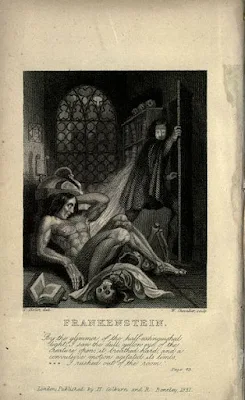The 1800s was a period of great literary experimentation, and science fiction was no exception.
Here are a few popular science fiction novels of the time:
These novels explored a variety of themes, including the limits of scientific knowledge, the relationship between humanity and technology, and the nature of humanity itself. Their legacy can be seen in the countless imitations and adaptations they have inspired, as well as in the continued popularity of science fiction as a literary genre.
- "Frankenstein" by Mary Shelley (1818): This novel tells the story of a young scientist who creates a sentient creature in his laboratory. The book explores themes of morality, responsibility, and the limits of scientific knowledge. "Frankenstein" is considered a classic of the horror and science fiction genres and has had a lasting influence on popular culture. Guillermo Del Toro has made a faithful film adaptation.
- "Journey to the Center of the Earth" by Jules Verne (1864): This novel follows a group of explorers who descend into a volcano and discover a vast, subterranean world. The book explores themes of exploration, discovery, and the relationship between science and adventure. "Journey to the Center of the Earth" is considered a seminal work of science fiction and has inspired countless imitations and adaptations.
- "The Time Machine" by H.G. Wells (1895): This novel tells the story of a scientist who invents a machine that allows him to travel through time. The book explores themes of evolution, social class, and the nature of time itself. "The Time Machine" is considered a classic of the science fiction genre and has been adapted into numerous films and television shows.
- "20,000 Leagues Under the Sea" by Jules Verne (1870): This novel follows a group of explorers who embark on a voyage aboard a submarine commanded by the enigmatic Captain Nemo. The book explores themes of exploration, technology, and the relationship between humanity and the natural world. "20,000 Leagues Under the Sea" is considered a seminal work of science fiction and has had a lasting impact on popular culture.
- "The War of the Worlds" by H.G. Wells (1898): This novel tells the story of a Martian invasion of Earth and the ensuing struggle for survival by humanity. The book explores themes of imperialism, colonialism, and the dangers of technological progress. "The War of the Worlds" is considered a classic of the science fiction genre and has been adapted into numerous films, radio dramas, and other media.
- "From the Earth to the Moon" by Jules Verne (1865): This novel tells the story of a group of adventurers who launch a giant cannon from Florida in order to reach the moon. The book explores themes of exploration, adventure, and the intersection of science and engineering. "From the Earth to the Moon" is considered a classic of the science fiction genre and has been adapted into numerous films, television shows, and other media.
- "The Island of Doctor Moreau" by H.G. Wells (1896): This novel follows the story of a shipwrecked man who finds himself on an island inhabited by a mad scientist who is conducting horrific experiments on animals to turn them into human-like beings. The book explores themes of evolution, morality, and the dangers of playing God. "The Island of Doctor Moreau" is considered a classic of the science fiction genre and has been adapted into numerous films and other media.
- "Flatland" by Edwin A. Abbott (1884): This novel is set in a two-dimensional world called Flatland and follows the story of a Square who has a series of adventures that challenge his perception of reality. The book explores themes of geometry, dimensionality, and social hierarchy. "Flatland" is considered a pioneering work of science fiction and has been influential in the development of the science fiction genre.
- "A Princess of Mars" by Edgar Rice Burroughs (1912): Although published just outside of the 1800s, it is still considered to be part of the period. This novel tells the story of a former Confederate soldier who is transported to Mars, which is inhabited by various alien species. The book explores themes of adventure, romance, and the potential for life on other planets. "A Princess of Mars" is considered a seminal work of science fiction and has been influential in the development of the planetary romance subgenre and had a major influence on Star Wars.
















